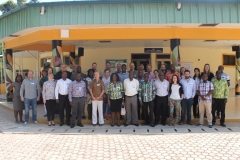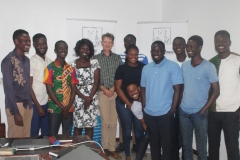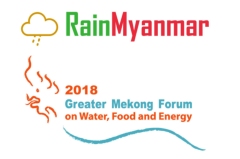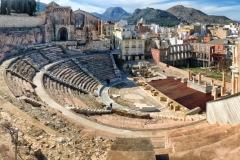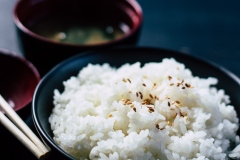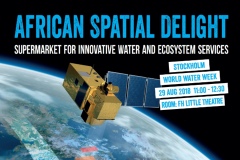Author: Martijn
28 February 2019
TWIGA Blog: Flying Sensors, a catalyst for revolution in farming
How can drone technology support our farming activities? This was the question that Kumasi farmers had when they went into the field for a drone workshop. Under the TWIGA Project, a consulting firm from the Netherlands called HiView was contracted by Future Water to deliver training on Flying Sensors to support Farmers’ Decision Making and Flood...
14 January 2019
TWIGA Blog: Project meeting in Kumasi, Ghana
TWIGA aims at the provision of currently unavailable geo-information on weather, water, and climate for sub-Saharan Africa. This is done by: Enhancing satellite-based geo-data with innovative in-situ sensors and; Developing related information services that address local needs of African stakeholders and the GEOSS community. The TWIGA days organized at the Kwame Nkrumah University of Science...
28 December 2018
TWIGA Blog: Successful drone training at KNUST in Kumasi, Ghana
Eleven motivated participants. A Flying Sensor. A challenging task to perform. Perfect facilities (Thank you Mr Isaac Duodu from Kumasi Business Incubator!). The right assistance (Mr Joel Budu from Farmerline!). That’s what it takes to perform a week’s training and finish it successfully. Coming from different professional backgrounds most of the trainees did not know...
11 December 2018
Socio-economic development is the key driver for the future South Asian water gap
The current United Nations Climate Change Conference COP24 held in Katowice, Poland once more demonstrates the world’s climate change concerns. In the Indus, Ganges, and Brahmaputra river basins, a global climate change hotspot and home for about 900 million people, these concerns are pressing, since the river systems provide water resources for the important agricultural,...
7 December 2018
Satellite technology and drone images to reduce groundwater use in Iran
The SMART-WADI project (SMART Water Decisions for Iran), carried out by a consortium of FutureWater, IHE-Delft, and local partner EWERI, focuses on farmers who irrigate their crops with groundwater. The aim is to provide up-to-date information and advice on water productivity, irrigation and farm management. The project combines the latest satellite technology for the quantification...
30 November 2018
FutureWater to launch RainMyanmar at the 2018 Greater Mekong Forum on Water, Food and Energy
Although rainfall stations continue to be an irreplaceable source of data, satellite-derived products provide valuable additional information on spatial patterns and remote sites where no stations are present. Thanks to Google Earth Engine, these data products are now publicly available and can improve water management policies, practice and research worldwide. RainMyanmar is an app targeted...
26 November 2018
Even 1.5 degrees is too much for South Asia
The river basins of the Indus, Ganges and Brahmaputra in South Asia are seen as climate change hotspots. These river basins, which are largely fed by mountain water are home to a population around 900 million people, which is likely to increase to al 1 billion halfway the 21st century. Climate change is expected to...
29 October 2018
Successful BRIGAID project meeting in Cartagena, Spain
During October 17, 18 and 19, several activities co-organized by FutureWater and Icatalist took place in Cartagena in the framework of the 6th Regular Meeting of the EU-H2020 BRIGAID project. During the first day, a selection of innovators, users and financing actors from the region and the rest of Europe were gathered around a thematic...
17 September 2018
Press release: Traditional Japanese cuisine is under threat from global water problems
Water scarcity and extreme weather events – both now and under climate change – outside Japan’s borders are expected to pose an increasing risk to Japan’s agri-food importers and to the wider consumer market. In Japan, many traditional culinary ingredients such as rice, edamame, miso and tofu (soybean products) – as well as increasingly popular...
9 August 2018
Stockholm World Water Week 2018: FutureWater will present ThirdEye’s Water Productivity service
FutureWater will participate in the African Spatial Delight side event of the Stockholm World Water Week 2018, convened by VIA Water, AfriAlliance and the G4AW programme of the Dutch government. The ThirdEye service of FutureWater and HiView, currently applied in Mozambique, Kenya and Ghana, is one of the innovations that will be presented and demonstrated...

